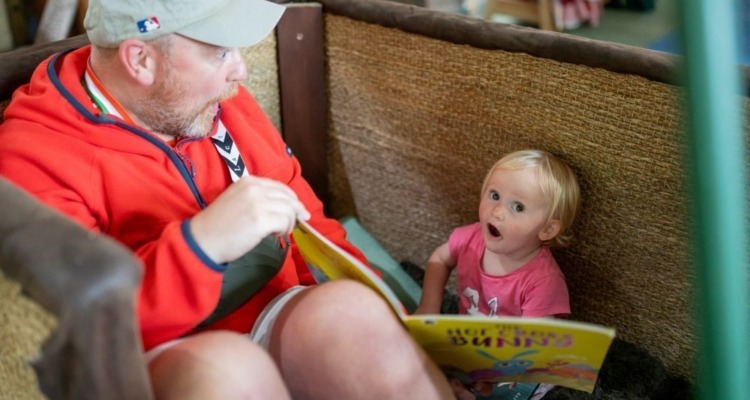Readers of the World: Nigeria
It's time once more for our fortnightly trip to foreign climes, to take a deeper look into what's going on with all things literature, bookish, story and reading related around the world.
The latest instalment comes from one of our Hope Readers Dave Cookson, who is exploring Nigeria... (if you want to catch up on any of our previous Readers of the World posts, you can take yourself on a mini round the world trip right here)
 Nigeria has the 7th largest population in the world, and English is its official language, often used in educational settings and is used by many as a second language.
Nigeria has the 7th largest population in the world, and English is its official language, often used in educational settings and is used by many as a second language.
The diversity of Nigeria means there is a wide range of literature in a variety of languages. Yoruba is spoken by 20 million, with the first novel in this language (The Forest of a Thousand Demons by D.A. Fagunwa) published relatively recently in 1938. Hausa is spoken by 25 million and the language’s first novel emerged from a competition ran by Northern Nigeria’s Translation Bureau. The winner was Muhammadu Bello’s 1933 work Gandoki. Igbo is a language spoken by some 20 million Nigerians, and The Proverbs of Omenuko by Pita Nwana was the language’s first novel, published in 1933, when another famous Igbo person was just three years old: Chinua Achebe.
Despite his Igbo background Achebe wrote in English, producing one of the most highly-acclaimed and widely read African books in history: Things Fall Apart. The novel is fiercely anti-colonial whilst acknowledging the flaws of pre-colonial society, following the deeply-flawed protagonist Okonkwo as he tries to dominate the village of Umuofia and then prevent it succumbing to the English colonialists. Things Fall Apart clearly drew on the proverbial influence of the Igbo culture demonstrated in the very first Igbo novel and throughout its rich history of story-telling.
Achebe’s novels are examples of the power of good story-telling, but his own experiences of storytelling and its benefits are not limited to politically-tinged novels. In the essay ‘My Daughters’ he tells of a time when his two-and-a-half year old daughter, Nwando, would cry on the way to her new American nursery school, not speak to anyone once she was there and on the way back would seem ‘desolate’. What happened next was beautiful:
"In the end we struck a bargain that solved the problem. I had to tell her a story all the way to school if she promised not to cry when I dropped her off. Very soon she added another story all the way back. The agreement, needless to say, taxed my repertory of known and fudged stories to the utmost. But it worked. Nwando was no longer crying. By the year’s end she had become such a success in her school that many of her little American schoolmates had begun to call their school Nwando-haven instead of its proper name, Wonderhaven.”
Despite being a country with such a short history involving the English language Nigeria has consistently produced brilliant writers including poets Christopher Okigbo and Wole Soyinka; author of The Voice, Gabriel Okara; Booker Prize winning author of The Famished Road, Ben Okri and author of Half of a Yellow Sun, Chimamanda Ngozi Adichie.
The frustrating thing about Nigeria and its rich literary history is that reports claim around half the country suffers with literacy problems. In a bid to combat this, President Goodluck Jonathan introduced the ‘Bring Back the Book’ initiative in December 2010. This was a national pledge to protect libraries, conduct readings of the country’s literature in educational institutions, research issues relating to reading and support organisations conducting reading-related activity. The ultimate aim of the initiative is to revitalise a reading culture in Nigeria.
BBB has incorporated numerous events into the initiative, with authors nominated for the Nigeria Prize for Literature being paired with children to read. However, the event took a surprising turn when an argument about witches erupted between a high school pupil and one of the nominees! At the same event a cultural activist claimed foreign cartoons were killing the folk tale tradition of Nigeria, and cartoons did no good to a child’s moral upbringing.
To take a nationalistic view of the merits of writing, particularly in English, Nigeria is a literary giant. If you’ve never read anything by one of Achebe, Okigbo or Soyinka then it’s about time you right that wrong.
Share
Related Articles

We cannot just tell parents to read more. To truly improve children’s futures through reading, we need to properly support the adults around them to do so.
Responding to the Department of Education's announcement that 2026 will be a Year of Reading, The Reader's Managing Director Jemma…

Storybarn Book of the Month: Saving the Butterfly
This month, as part of Refugee Week (16-22 June), we've been taking a look back at one of our favourites…

Shared Reading in Wirral Libraries: ‘As a kid people read stories to you but as an adult you lose that – and it’s a fantastic thing to do!’
Two Strategic Librarians for Wirral Libraries, Kathleen McKean and Diane Mitchell have been working in partnership with the UK’s largest…


